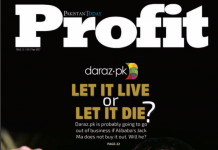The digital ad spend of Pakistan is almost $15 to $20 million at present and it is expected to grow by at least 40 percent in 2018,” said Badar Khushnood, the Country Consultant for Twitter and one of the three Co-Founders of Bramerz, a top-notch digital marketing agency operating out of Lahore.
Bramerz has led the digital marketing scene in the country over much of the past decade. In fact, it won’t be wrong to say that growth of Bramerz is synonymous to the growth of digital media in the country.
Bramerz, which has to its credit projects like Pakistan Super League, and Uber, and served multinational giants like Nestle, Unilever, Levi’s, Samsung, and PepsiCo, inspired a whole generation of digital marketing professionals and launch of many new players in the past few years.
However, times seem to have changed now and competition intensified.
With some of the large brands, especially multinational companies, willing to spend up to $3 million on digital campaigns, the relevant spend is expected to increase to 15 percent of the total media ad spend this year. Market estimates suggest it can reach up to 30 percent of the traditional ad spend by 2020.
With the industry growing at this unprecedented rate, digital marketing agencies, like Bramerz who had first movers advantage in the arena and were set to tap this growing market, are feeling the pinch as traditional advertising agencies and media buying houses eat into their market.
In other words, specialised digital marketing players are now faced with competition from traditional players, which are using their regional affiliations to steal away large multinational clients that were once catered by those who specialise in digital media — and Bramerz seems to be worst hit.

As the battle for a share in the rapidly growing digital space intensifies, Profit takes a look at how companies like Bramerz with their specialised knowledge of the field and early mover advantage consolidate themselves to prepare for the challenge ahead.
The rise of Bramerz
Digital marketing has become a lucrative segment for advertisers over the last couple of years, thanks to the explosive growth in the number of broadband and social media users in the country. However, it was companies like Bramerz that started working on this market segment long before it could evolve into an important business segment.
It started about a decade ago when digital market players came to Pakistan. At that time, brands were looking at the digital platform mainly as a tool for corporate social responsibility (CSR) and PR campaigns. It was the time when companies like Bramerz saw an opportunity.
What started as an inspiration that three graduates namely, Badar Khushnood, Zeeshan Salim and Amer Sarfraz discussed in their drawing rooms, quickly turned into a reality when in 2006 Bramerz in 2006 won its first contract from Nestle Pakistan.
 Nestle was looking for an agency with specialists certified by Google, a criteria not every company could meet which is why Bramerz got the contract – courtesy Sarfraz who had received a certification in Google Adverts in 2007. Bramerz is a Google Certified Partner with its specialists bearing certification in Google Analytics, Google Apps and Google Adsense. In fact, Bramerz is one of the 42 Google Adsense partners in the world and the only in Pakistan to have this accreditation.
Nestle was looking for an agency with specialists certified by Google, a criteria not every company could meet which is why Bramerz got the contract – courtesy Sarfraz who had received a certification in Google Adverts in 2007. Bramerz is a Google Certified Partner with its specialists bearing certification in Google Analytics, Google Apps and Google Adsense. In fact, Bramerz is one of the 42 Google Adsense partners in the world and the only in Pakistan to have this accreditation.
At the time Amer Sarfraz was working for PIA as a sales representative in Lahore while simultaneously was working on Bramerz in his free time, sometimes even during his lunch breaks. Similarly Badar Khushnood was Google’s representative in Pakistan and was also a sleeping partner in Bramerz.
To add to its accomplishments, the agency stood successful in establishing and maintaining the entire digital ecosystem of the inaugural edition of Pakistan Super League. Khushnood, termed this online coverage of PSL, Mission critical.
“Though the lucrative cricket league was played in Dubai, digital experts at the Lahore office of Bramerz managed to provide ball by ball score update on the PSL website,” said Khushnood.
The digital service provider was also involved in helping international companies like Uber, Dell and Telenor Digital (Norway) for their product WowBox – a job made easier because of their background in the technology industry.
Bramerz introduced several other online tools and services. Although their first product, a blogging platform by the domain name buzzvines.com, wasn’t very successful, other projects are some of the market favorites. The list includes Publishrr.com – a platform that provides tailor-made web content management systems for newspapers, magazines, and TV and radio channels. It successfully launched inboxerz.com, an email marketing tool; clickclick.pk, an ad network for Pakistan; olround.me, a location-based loyalty service app that help users explore restaurants and retail stores nearby their locations; and fishry.com, an auto-manageable ecommerce solution.
“We studied the market carefully and launched applications when people needed them the most,” said Khushnood. “We aim to be even more active in the coming years as companies are now allotting special budgets for their digital development, which wasn’t the case when we started.”
From a small-time freelance agency run by three people, Bramerz went from strength to strength to become a digital services giant, which now employs more than 100 people and has its talons spread across multiple sectors of the digital market. It provides all kinds of digital services: advertising, publishing, monetizing, content management, product marketing, servicing arms, B2B and B2C lead generation, and claims, “We are not only directing eyeballs to our clients’ digital podiums, we are also helping them sell.”
The company booked $3 million in annual revenues last year and was growing at an impressive growth rate of 25 percent according to Khushnood.
If numbers are any indication, the digital ad spend has seen exponential growth in the last couple of years. This growing demand for digital service providers meant more business for digital players. For example, a few years ago Bramerz initiated 3s Crowd, another digital marketing agency to cater to the demands they received from the competitors of their existing clients.
“We work with clients like Nestle and Samsung. At the same time, their competitors like Wall’s and Huawei want us to provide them services,” Khushnood had told Profit in an interview last year explaining how growing demand for their services led them to form new subsidiaries. “To maintain confidentiality for each client, we have launched another company.”
The advent of new social media platforms have enhanced the scope for digital marketing. In other words, digital agencies have a lot more outlets to place the content of their clients on.
Exact numbers are hard to find as one connection can be used by multiple users but as per official numbers, 50 million people have access to the internet in Pakistan with almost 40 million mobile broadband connections or smartphone users. More than 2 million people use Facebook, 3 million people use Twitter, and 1.5 million people use Instagram in Pakistan.
However, just when things were looking good for Bramerz and the likes, the size of the pie grew too big to lure the traditional ad agencies and media buying houses, which used their regional affiliations and made it hard for digital only players to retain large clients.
“Digital penetration and the surge in availability of cheaper smartphone made brands realize that they needed to move from corporate PR to creating brand advocacy on social media,” said Ahmed Nizami, CEO of Digital Headquarters (DHQ), one of the leading digital marketing agencies in Pakistan owned by Interflow Communications, which is an affiliate of Bates, an international advertising agency.

Talking about recent changes in the digital marketing scene, Nizami said with growth in smartphone and social media penetration, digital agencies started gearing up to produce content for brand advocacy. “For example, if Nestle has twenty brands, each of them will have its own social media page and they [digital marketing agencies] creating content to get consumer engagement and create advocacy along with A standard corporate page.”
Nizami said digital started eating into the market share of traditional  media buying houses some of the money spent on TV and print advertisement diverted to digital.
media buying houses some of the money spent on TV and print advertisement diverted to digital.
As a result of the growth in digital ad spend, traditional advertising agencies and media buying houses, which have affiliation with international advertising agencies used their regional partners (those based in Dubai, for example) to win the digital marketing contracts for the Pakistani subsidiaries of their multinational clients.
PepsiCo and Coca-cola, which were major clients of Bramerz went to traditional media buying houses. And it didn’t stop here. Bramerz also lost most of Nestle’s business.
According to some industry sources, their revenues are now one-tenth of what they were at their peak.
“We haven’t lost most of our multinationals clients” Sarfraz from Bramerz told Profit rubbishing street talk that they have suffered heavily. “We lost mainstream brands of Nestle, we are only left with two categories now,” he added.

Sarfraz, however, acknowledged they lost Pepsi and Coke, adding when it comes to the business of media buying, the traditional agencies do influence their regional partners. Explaining, he said the actual call for awarding the advertising contract is local that is the decision should be taken in Pakistan. But the problem is that locals [Pakistani arms of MNCs] are so scared that they don’t really stand up.
“Although there is global push, but the final call still is with the local management, however, digital being such a small share of the overall media, they see less reasoning to deal with a separate digital agency and choose to work with one global partner,” Sarfraz said. “Most of the MNCs have global agency alliances and that’s where the business shifts. Sometimes, it has little to do with the agency expertise, but rather the network that pulls the business away,” he said.
Bramerz fight back
With large clients lost to the local partners of international and regional advertising giants, Bramerz have started focusing on national companies because “their decisions are not taken in Dubai”. They recently won a contract from local broadband giant Pakistan Telecommunication Company and are tapping into small and medium-sized business, a huge market segment that is adopting digital.
“More cash flow is expected from SMEs in the years to come,” Khushnood said adding, “The audience is getting closer to companies as digital penetration is increasing in the country.”

However, Bramerz didn’t stop here. It first tried to get affiliation from international advertising agencies whose multinational clients have presence in Pakistan. But it turned out, all those agencies already had local media partners in Pakistan. Next, they reached to agencies with no partners in Pakistan, but that didn’t work either because they didn’t have clients in Pakistan.
But for a company, that has remained on the forefront of digital advent, giving up wasn’t an option because they can’t afford to lose multinational clients. So they decided to take the battle to the competition’s home turf.
They got in touch with the regional head offices and pitched directly to the principals of multinational clients for handling their digital media. With the kind of track record, it had, Bramerz was able to win a contract from Tetra Pak, not only its Pakistani subsidiary but also for the entire region.
Read: Taking the fight to the big boys

The challenge ahead
It wasn’t just the expertise of Bramerz that helped them win a regional contract, the traditional ad agencies seem to have played a part. For example, they managed to bag some lucrative contract for digital marketing, but experts believe that they don’t seem to be providing the same level of quality work and it will be challenging for them to deliver on the digital front.
“Many agencies are still working with traditional mindset, in nontraditional media. What needs to be done in Pakistan is you need nontraditional thinking in nontraditional media,” Nizami of DHQ said.
It is for this reason, DHQ is working as a separate digital marketing agency as opposed to being a digital wing of a traditional agency, he said.

“Creating consumer engagement consumers to attain Top of mind has become increasingly difficult and challenging for the brands now,” Nizami said. Referring to traditional agencies, he said they need to see if they could participate in content-led innovation and become part of the programs. “It is happening around the world, but in Pakistan what is happening on TV is being replicated in social media too. This is a mindset problem – what advertisers need to realise
Nizami says to understand digital, you need to understand the customer interacts with digital in a very different way than he interacts with conventional advertising.
With the kind of growth digital media has seen in the last couple of years, content-led innovation, which leads to consumer engagement becomes even more important. “As digital penetration increases, digital disruption will come all over the country,” Nizami said.
The market talk is traditional agencies are still working traditional thinking and can’t bring brand advocacy unless they change this mindset.
Facebook is the biggest phenomenon in recent times. It curates content, Nizami says. The biggest library in the world right now might be YouTube and there, too, people are creating their own content, he said. The giant players in the world of content, even biggest newspapers, are now coming on Facebook. “We need to catch them [audience] where they are,” Nizami says.
In Pakistan, internet penetration is increasing as nearly one-fifth of its population is online and smartphones are also becoming available to more people. WiFi spots, smartphones, and apps are all increasing. This must be exciting times for advertisers dealing in digital media. However, experts also warn it will get harder in the future, because one person will be targeted by so many people and only those with best content will be able to bring engagement.
“The biggest difference in conventional and Digital is that in the latter the communication is two way. You don’t have to wait for brand health tracking researches to see how well your campaigns are doing. Results are instant. One can measure instantly if there is positive engagement and you are generating actual brand advocacy” Nizami says. “The measure now is not mass reach, it is engagement,” he adds.























Fascinating spin 🙂
I don’t think bramerz has expertise and talent needed to win in today’s competitive space of digital marketing. I believe bramerz is way behind international digital marketing agencies and following old practice. I mean if you look at their own Facebook page it’s not even good. Look like some kids are managing it. On the other side if you look at facebook pages of international digital marketing agency you will feel the difference. Wake up bramerz upgrade yourself.
A nice informative article
Excellent weblog here! Also your web site rather a lot
up very fast! What web host are you using? Can I get your associate
link on your host? I want my web site loaded up as quickly as yours
lol
Thanks great article or content
Comments are closed.